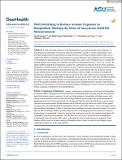Well‐Switching to Reduce Arsenic Exposure in Bangladesh: Making the Most of Inaccurate Field Kit Measurements
Author(s)
Jameel, Yusuf; Mozumder, M. Rajib Hassan; Geen, Alexander; Harvey, Charles F.
DownloadGeoHealth - 2021 - Jameel - Well‐Switching to Reduce Arsenic Exposure in Bangladesh Making the Most of Inaccurate Field.pdf (3.020Mb)
Publisher with Creative Commons License
Publisher with Creative Commons License
Creative Commons Attribution
Terms of use
Metadata
Show full item recordAbstract
Well-switching programs in Bangladesh have successfully lowered arsenic exposure. In these programs, households switch from wells that are labeled “unsafe” to nearby wells labeled “safe,” but these designations are usually based on inherently inaccurate field kit measurements. Here, we (a) compare the efficacy of field-kit measurements to accurate laboratory measurements for well switching, (b) investigate the potential impact on well switching of the chosen “safe” threshold, and (c) consider the possible benefits of providing more detailed concentration information than just “safe” and “unsafe.” We explore different hypothetical mitigation scenarios by combining two extensive data sets from Araihazar Bangladesh: a blanket survey of 6595 wells over 25 km2 based on laboratory measurements and 943 paired kit and laboratory measurements from the same area. The results indicate that the decline in average arsenic exposure from relying on kit rather than laboratory data is modest in relation to the logistical and financial challenge of delivering exclusively laboratory data. The analysis further indicates that the 50 μg/L threshold used in Bangladesh to distinguish safe and unsafe wells, rather than the WHO guideline of 10 μg/L, is close to optimal in terms of average exposure reduction. We also show that providing kit data at the maximum possible resolution rather than merely classifying wells as unsafe or safe would be even better. These findings are relevant as the government of Bangladesh is about to launch a new blanket testing campaign of millions of wells using field kits.
Date issued
2021-12Department
Massachusetts Institute of Technology. Department of Civil and Environmental EngineeringPublisher
American Geophysical Union (AGU)
Citation
Jameel, Y., Mozumder, M. R. H., van Geen, A., & Harvey, C. F. (2021). Well-switching to reduce arsenic exposure in Bangladesh: Making the most of inaccurate field kit measurements. GeoHealth, 5, e2021GH000464.
Version: Final published version
ISSN
2471-1403
2471-1403